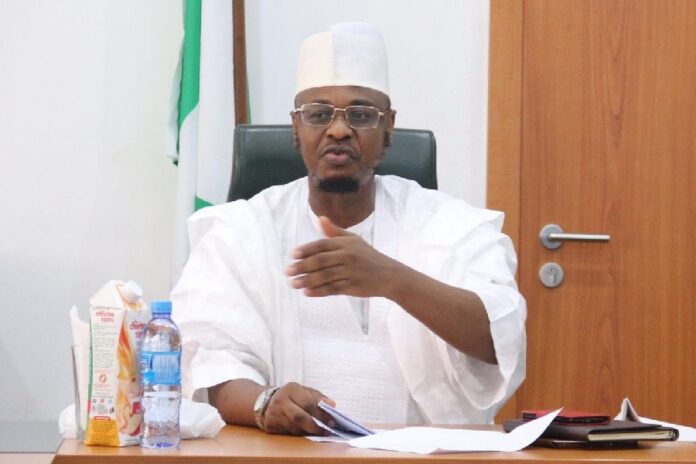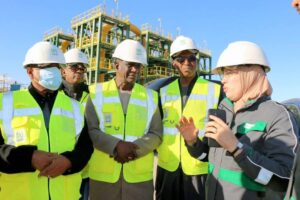Headlines
Nigeria to migrate to paperless government by 2030

The Federal Government of Nigeria has disclosed that it is targeting 2030 to migrate all paper activities of the government to paperless.
The Minister of Communications and Digital Economy, Prof. Isa Pantami made the disclosure in Abuja during the Champion Day and Closing of 2021 Service Wide Capacity Building program on e-Government.
According to Pantami, “The target of the Federal Government is to make sure that by 2030, we achieve a paperless government where emerging technologies like Blockchain that has data integrity and many more is guaranteed.”
The Minister noted that the achievement of paperless government is very possible because government is desirous of digitizing its processes. He however maintained that technology cannot do it alone.
In his words, “We must ensure that we train ourselves so that we manage the technology effectively for the betterment of our country.”
He added that the Federal Government spent a total of N152billion on digitalization in 2021, the amount, he said, was “a quantum leap from the N9 billion spent in 2019 and 2020.”
Pantami stated that the amount constitutes the total sum approved by the National Information Technology Development Agency (NITDA) for the Central Bank of Nigeria (CBN), the Nigerian National Petroleum Corporation (NNPC), Corporate Affairs Commission (CAC), Immigration, and Customs among other agencies of government for the 2021 fiscal year.
He noted that the Federal Government is committed to the implementation of digitizing its processes for effective service delivery.
“To show us the level of implementation of the government’s digital services in the country, from January to December 2021, NITDA, on behalf of the government, has approved the execution of 499 projects. However, the approved projects include the backlog of 2020 and 2019,” the Minister noted.
In her goodwill message, the Head of Service Civil of Federation (HoSCF), Dr Folashade Yemi-Esan disclosed that many Ministries, Departments, and Agencies of government are on the verge to digitalize their processes.
She assured that by the end of the year, many successes would have been recorded in the nation’s drive to digitalization.
While applauding the Ministry of Communications and Digital Economy and its parastatals for the support in ensuring that processes at the Office of Head of Service for the Federation are digitalized, she noted that “the gestures would go a long way in assisting us to achieve our own dream.”
Dr Yemi-Esan acknowledged NITDA for the role it is playing to get the Office of Head of Service of the Federation a platform that would enhance digitalization of government processes.
While describing the training as very appropriate, Dr Yemi-Esan urged the trainees to ensure that they replicate what they have learnt in their respective MDAs by training other staff.
Meanwhile, the Director-General of NITDA who also doubled as the Council’s Chairman, e-Government Training Centre, Kashifu Inuwa, said the Federal Government had trained 1,376 civil servants from 48 ministries, departments and agencies between November 2020 and December 2021 in the use of ICT.
He said the capacity building programme for civil servants is part of the federal government’s e-Government Master Plan aimed at digitizing every government process in all ministries, departments, and agencies (MDAs).
The NITDA boss recalled that the journey started in November 2019 when President Muhammadu Buhari directed that the Centre should be used to build the capacity of the federal civil servant.
While acknowledging the civil servant as the engine room of the government, Inuwa maintained that if the government wishes to transform, the civil servants need to be transformed first.
Adding that transformation is not just about technology, he said: “we need the people that will operate the technology, if we don’t have the people or a proper process in place, we would not have value from the technology.”
Headlines
Noble Ladies Champion Women’s Financial Independence at Grand Inauguration in Abuja

Women from diverse backgrounds across Nigeria and beyond gathered at the Art and Culture Auditorium, Abuja, for the inauguration and convention of the Noble Ladies Association. The event, led by the association’s Founder and “visionary and polished Queen Mother,” Mrs. Margaret Chigozie Mkpuma, was a colourful display of feminine elegance, empowerment, and ambition.
The highly anticipated gathering, attended by over 700 members and counting, reflected the association’s mission to help women realise their potential while shifting mindsets away from dependency and over-glamorization of the ‘white collar job.’ According to the group, progress can be better achieved through innovation and creativity. “When a woman is able to earn and blossom on her own she has no reason to look at herself as a second fiddle,” the association stated.
One of the association’s standout initiatives is its women-only investment platform, which currently offers a minimum entry of ₦100,000 with a return of ₦130,000 over 30 days—an interest rate of 30 percent. Some members invest as much as ₦1 million, enjoying the same return rate. Mrs. Mkpuma explained that the scheme focuses on women because “women bear the greater brunt of poverty” and the platform seeks “to offer equity in the absence of economic equality.”
Education is also central to the Noble Ladies’ mission, regardless of age. Their mantra, “start again from where you stopped,” encourages women to return to school or upgrade their skills at any stage in life. The association believes that financial stability is vital in protecting women from cultural practices that dispossess widows of their late husbands’ assets, while also enabling them to raise morally and socially grounded families.
Founded on the vision of enhancing women’s skills and achieving financial stability, the association rests on a value system that discourages pity and promotes purpose. “You have a purpose and you build on that purpose to achieve great potentials and emancipation,” Mrs. Mkpuma said.
A criminologist by training and entrepreneur by practice, she cautions against idleness while waiting for formal employment. “There are billions in the informal and non-formal sectors waiting to be made,” she said, rejecting the “new normal of begging” and urging people to “be more introspective to find their purpose in life and hold on to it.”
Mrs. Mkpuma’s management style keeps members actively engaged, focusing on vocational skills and training to prepare them for competitive markets. She is exploring “innovative integration of uncommon technologies” and is already in talks with international franchises to invest in Nigeria, with Noble Ladies as first beneficiaries.
The association’s core values include mutual respect, innovation, forward-thinking, equal opportunity, and financial emancipation. With plans underway to establish a secretariat in the heart of Abuja, the group aims to expand its impact.
The event drew high-profile guests, including former Inspector General of Police, Mike Okiro, and a host of VIPs, marking a significant milestone in the association’s drive for women’s empowerment.
Headlines
NEPZA, FCT agree to create world-class FTZ environment

The Nigeria Export Processing Zones Authority (NEPZA) has stepped in to resolve the dispute between the Federal Capital Territory Administration and the Abuja Technology Village (ATV), a licensed Free Trade Zone, over the potential revocation of the zone’s land title.
Dr. Olufemi Ogunyemi, the Managing Director of NEPZA, urged ATV operators and investors to withdraw the lawsuit filed against the FCT administration immediately to facilitate a roundtable negotiation.
Dr. Ogunyemi delivered the charge during a courtesy visit to the Minister of the Federal Capital Territory, Barrister Nyesom Wike, on Thursday in Abuja.
You will recall that the ATV operators responded to the revocation notice issued by the FCT administration with a lawsuit.
Dr. Ogunyemi stated that the continued support for the growth of the Free Trade Zones Scheme would benefit the nation’s economy and the FCT’s development, emphasizing that the FCT administration recognized the scheme’s potential to accelerate industrialisation.
Dr. Ogunyemi, also the Chief Executive Officer of NEPZA, expressed his delight at the steps taken by the FCT minister to expand the economic frontier of the FCT through the proposed Abuja City Walk (ACW) project.
Dr. Ogunyemi further explained that the Authority was preparing to assess all the 63 licensed Free Trade Zones across the country with the view to vetting their functionality and contributions to the nation’s Foreign Direct Investment and export drives.
“I have come to discuss with His Excellency, the Minister of the Federal Capital Territory on the importance of supporting the ATV to succeed while also promoting the development of the Abuja City Walk project. We must work together to achieve this for the good of our nation,” he said.
On his part, the FCT Minister reiterated his unflinching determination to work towards President Bola Ahmed Tinubu’s Renewed Hope Agenda by bringing FDI to the FCT.
“We must fulfil Mr. President’s promises regarding industrialization, trade, and investment. In this context, the FCT will collaborate with NEPZA to review the future of ATV, a zone that was sponsored and supported by the FCT administration,” Wike said.
Barrister Wike also said that efforts were underway to fast-track the industrialisation process of the territory with the construction of the Abuja City Walk.
The minister further said the Abuja City Walk project was planned to cover over 200 hectares in the Abuja Technology Village corridor along Airport Road.
According to him, the business ecosystem aimed to create a lively, mixed-use urban center with residential, commercial, retail, hospitality, medical, and institutional facilities.
He added that the ACW would turn out to be a high-definition and world-class project that would give this administration’s Renewed Hope Agenda true meaning in the North-Central Region of the country.
Barrister Wike also indicated his continued pursuit of land and property owners who failed to fulfil their obligations to the FCT in his determination to develop the territory.
Headlines
Benue IDPs block highway, demand return to ancestral homes

Vehicular movement along the Yelwata axis of the Benue–Nasarawa highway was brought to a standstill on Wednesday as Internally Displaced Persons, IDPs, staged a protest, demanding immediate return to their ancestral homes.
The protesters, believed to be victims of persistent attacks by suspected herdsmen, blocked both lanes of the busy highway for several hours, chanting “We want to go back home”.
The protest caused disruption, leaving hundreds of motorists and passengers stranded.
Eyewitnesses said the displaced persons, many of whom have spent years in overcrowded IDP camps, are expressing deep frustration over the government’s delay in restoring security to their communities.
“We have suffered enough. We want to return to our homes and farms,” one of the protesters told reporters at the scene.
Security personnel were reportedly deployed to monitor the situation and prevent any escalation, though tensions remained high as of press time.
Efforts to reach the Benue State Emergency Management Agency, SEMA, and other relevant authorities for comment were unsuccessful.
-

 Headlines4 years ago
Headlines4 years agoFacebook, Instagram Temporarily Allow Posts on Ukraine War Calling for Violence Against Invading Russians or Putin’s Death
-

 Headlines4 years ago
Headlines4 years agoNigeria, Other West African Countries Facing Worst Food Crisis in 10 Years, Aid Groups Say
-

 Foreign4 years ago
Foreign4 years agoNew York Consulate installs machines for 10-year passport
-

 News1 year ago
News1 year agoZero Trust Architecture in a Remote World: Securing the New Normal
-

 Entertainment3 years ago
Entertainment3 years agoPhyna emerges winner of Big Brother Naija Season 7
-

 Headlines1 year ago
Headlines1 year agoNigeria Customs modernisation project to check extortion of traders
-

 Entertainment2 years ago
Entertainment2 years agoMovie download platform, Netnaija, announces closure
-

 Economy2 years ago
Economy2 years agoWe generated N30.2 bn revenue in three months – Kano NCS Comptroller



















